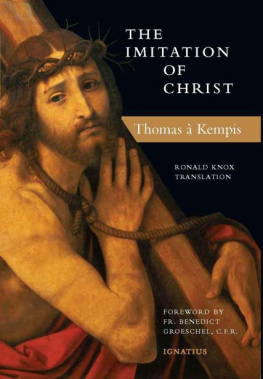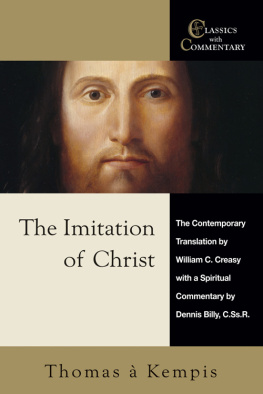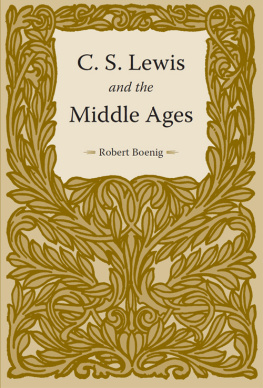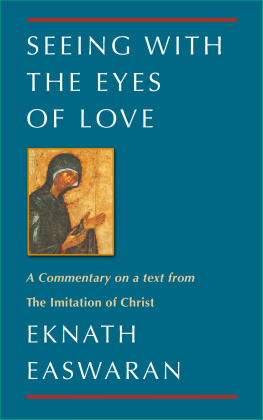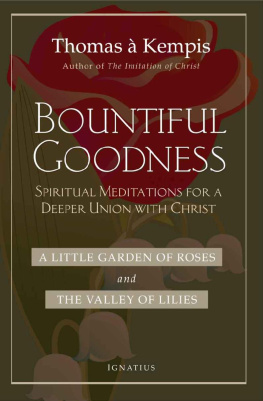THE IMITATION OF CHRIST
THE IMITATION
OF CHRIST
by
THOMAS KEMPIS
Translated by Ronald Knox
and
Michael Oakley
with a Foreword by
Father Benedict J. Groeschel, C. F.R .
IGNATIUS PRESS SAN FRANCISCO
Nihil Obstat: Joannes M. T. Barton, D.D., L.S.S., Censor Deputatis
Imprimatur: E. Morrogh Bernard, Vicarius Generalis
Westmonasterii: Die XVIII Septembris MCMLIX
1959 by Evelyn Waugh and Michael Oakley
All rights reserved
First published 1959, Burns & Oates, London
Reprinted by permission of the Earl of Oxford
and Asquith and A. P. Watt Limited, London
Cover art: Christ Carrying the Cross (detail)
Andrea Solario (1480-1540)
Galleria Borghese, Rome
Scala / Art Resource, New York
Cover design by Roxanne Mei Lum
Reprinted in 2005 by Ignatius Press, San Francisco
ISBN 978-0-89870-872-1 (hb)
Library of Congress Control Number 2005926541
Printed in the United States of America
CONTENTS
Practical advice about the spiritual life
Chapters
(b) About the ambition to do better
(b) On true and false confidence
(c) On the love of ones cell
Considerations inviting us to live an interior life
On inward consolation
About the Blessed Sacrament: A devout encouragement to receive Holy Communion
FOREWORD
When I was asked to write a few lines about the reissue of the Knox-Oakley translation of The Imitation of Christ , which many consider the greatest spiritual classic after the Bible, my mind went back to a day almost sixty years ago. I was coming home from Saint Aloysius school in Caldwell, New Jersey, a quiet suburban town. I had a little spare time and went into the public library. Because I was still in grammar school, I was not permitted to take books from the adult section but was allowed to browse through the stacks.
As I often did, I went to the religion section, where I saw a fascinating and ancient gold-edged book with a metal-lined cover and clasp. It was The Imitation of Christ . The title suggested to my twelve-year-old mind that this must be a story about someone who pretended to be Jesus. I took the book from the shelf and went and sat by a window. The spring sun shone on the oak tables. I can still see my blue-sweatered arm around the book as I began to read. A sweet muskiness, almost like incense, came from the book long closed, and I entered a fascinating world. I opened the first page and read: Vanity of vanities... All is vanity except to love God and serve Him alone. At that moment I was electrified, and I sat there reading page after page of the first book of The Imitation , in a stilted old English translation. The next thing I knew, the librarian was tapping me on the shoulder. It was five oclock and closing time; I had been there almost two hours, mesmerized by the book.
I wanted to take the book out of the library, but I knew that that would not be permitted, so I quietly slipped it into my schoolbag, noting from the withdrawal card inside that no one had borrowed the book in years. I carefully returned the book to its rightful place on the shelf in two weeks time, the ordinary period for a book loan in those days.
By then I had begged a saintly old nun, Sister Victoria, to give me my own copy; it had a similar translation in a simpler binding. For the next ten or fifteen years, until I was ordained, I read The Imitation almost every day. When I was in the seminary, I got a wonderful edition put out by the Confraternity of the Precious Blood, with fascinating engravings that captured the spirit of The Imitation of Christ .
Now, decades later, as I return to the text in the excellent translation of Msgr. Ronald Knox (1888-1957), completed after his death by the classicist Michael Oakley, it is like meeting an old friend I havent seen for a long time, although we have encountered each other now and then over the years.
Msgr. Knox, as many readers of this edition will know, was a convert from Anglicanism and an outstanding Catholic author of the vibrant period of Catholicism that extended from the 1920s to Vatican II. He translated the Latin Vulgate Bible into splendid English and made a number of other contributions to the spiritual literature of the period. Knox was known for his dry English humor. While chaplain to Catholic students at Oxford, he supplemented his work financially by writing mystery stories. It is said that he wanted his translation of the Bible to be advertised as the work of the author of The Viaduct Murder . Among other of his works were A Spiritual Aeneid (1918), Let Dons Delight (1939), and several collections of conferences and sermons, including The Hidden Stream (1953) and TheWindow in the Wall (1956). His book Enthusiasm (1950) was a solid contribution both to Church history and to the psychological understanding of popular trends, particularly Evangelical Protestantism. His whole body of work reflects the high level of culture and education of his family. He was a son of the Anglican bishop of Manchester and was educated at Eton and Oxford in the early part of the twentieth century.
Knoxs preface to this translation gives a good explanation of the four books that go to make up the work. The purpose and focus of each are quite distinct, but they are brought together by the fervent devotion that later characterized the piety of the Catholic Reformation of the sixteenth century. The Imitation has come to be seen as the major work of the devotio moderna , which was characterized by psychological insight and an orderly study of the path to contemplation and the love of God.
Today, a reader unfamiliar with The Imitation , which, like many classics, was all but lost in the hustle and bustle of postVatican II spiritual interests, might wonder why so many great Christians have found this work very important on their journey. The answer will come from reading Msgr. Knoxs preface and then carefully reflecting on the contents of the four books. It might be wise to select one and read it carefully. My own experience led me even as a teenager to rely heavily on the third and fourth books, from which I can still quote many lines about the love of God and neighbor.
Dont look for answers to every question in The Imitation . It does not directly address such topics as the care of the needy and social responsibility. Nor is it directed toward liturgical piety, which is so important to Catholics of our time. In areas of the spiritual life on which it focuses, however, it is startlingly revealing. It is worthwhile knowing that one of the great Christians of modern times, Saint Thrse of Lisieux, not only found this book helpful but is said to have been able to quote much of it verbatim.
If we could construct a composite picture of all the great ChristiansCatholic or non-Catholicof the last five hundred years who found The Imitation substantially beneficial, enlightening, and inspiring, we would need no further evidence that a familiarity with this great classic is an integral part of a mature spiritual life and even a path to holiness. As for myself, I have returnedafter a couple of decadesto being a devoted reader of The Imitation of Christ .
Father Benedict J. Groeschel, C.F.R.
FOREWORD
TO THE 1959 EDITION
Monsignor Knox had for many years before his death made a practice of reading a daily chapter of The Imitation of Christ , and it was no matter for surprise that the hand which had given us a masterly new version of the Bible in English should stray towards that time-proved compendium of the spiritual life with which the years had made him increasingly familiar. He had for several years shown a characteristically generous interest in my literary work, whether original or translation, and I was much flattered when in June 1955, after commenting favourably on a version of the Iliad I had completed in the style of the original translator, he wrote to me: If I die without finishing my translation of the Imitation of Christ , please tell my executors from me that you are to finish it. I little imagined, when I received this letter, that I should ever be called upon to do so; but only two years later, a bare two months before his death, he wrote in what was to be his last letter to me, I think I told you Id instructed Watt [his literary agent] that you were to have the option of finishing off my rendering of the Imitation , if I left it unfinished. Im afraid the present state of my health makes it unlikely that I shall go on with it, and at present its only reached Bk. II, chap. 4. So dont feel bound to do it if it comes your way; but try your hand if it attracts you. My idea has been to get rid of theological terms (which Thomas Kempis uses rather uncomprehendingly, I think)... i.e., I wanted to turn it into a human document. In his last interview with Mr. Evelyn Waugh, his literary executor, he expressed the hope that I would finish the translation.
Next page
